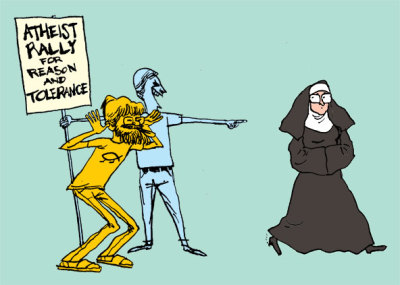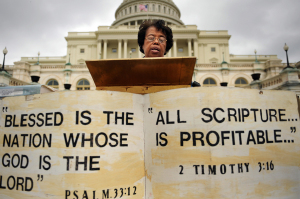Apologetics and the indoctrinated American atheist

Over the last fifteen years, I have engaged extensively with atheists across North America. I've spoken to local groups, participated in live and radio debates, traded emails, shared various conversations over coffee, and had countless exchanges on my blog. And I can report that my experiences are echoed in sociologists David Williamson and George Yancey's book There is No God: Atheists in America. The book seeks to understand some common characteristics of the atheistic, secular humanist, freethought community by way of extensive interviews with atheists on topics like politics, ethics, and religion. And while neither I nor Williamson or Yancey would claim the characteristics I'm about to discuss are universal, they are, nonetheless, disturbingly common.
One trait which I have oft observed among atheists is a sharp division between the allegedly rational irreligious in-group and the irrational religious outgroup. So too, Williamson and Yancey observe, “atheists tend to argue that their beliefs about religion come from a rational exploration for truth, as opposed to the irrationality of religious out-groups." (40)
Since atheists commonly assume that they are especially rational and the religious are irrational, they often dismiss Christian apologetics as a tortured, ad hoc rationalization, a pained attempt to defend the indefensible. This dismissive attitude serves to perpetuate in-group solidarity and dismiss out-group criticisms. Williamson and Yancey develop this theme in chapter 4 which is aptly titled “The Foolishness of Religion.” In one interview an atheist respondent made the following observation:
"It is time for those who challenge religion to come out of the closet, as it were. It is time to stare religion of any stripe in the face with fierce and undaunted truth, the truth that belief in imaginary friends is natural and expected in a 6-year-old. But just as a child develops and then rejects childish ideas, so must humankind abandon belief in an omniscient, omnipotent being." (50-1)
This tendency to dismiss God, religion, and Christianity as infantilized and irrational denials of the overwhelming weight of evidence is pervasive within this "skeptic" community.
As you can expect, these sharp binary oppositions perpetuate a tendency toward indoctrination and inhibit the atheist's ability to engage rigorously with the views of others. As Williamson and Yancey observe, "Because atheists have a tendency to see people of faith as irrational, they have a hard time understanding how individuals maintain religious beliefs." (51)
Williamson and Yancey’s study includes both survey data and in-depth interviews. One of the in-depth interviews was conducted with a young man named “Ralph” and it effectively conveys the average skeptic’s general sense of incredulity toward religion and Christianity:
"Ralph truly struggles to accept the fact that an intelligent person can be religious. He likely struggles more with an inability to understand how intelligent people can be religious than other atheists, but the struggle itself is quite common among atheists. Many of them simply do not believe that a logical individual can have religious faith. For them, nonbelief is the only rational approach for an individual." (53)
Williamson and Yancey draw some general conclusions about the reasoning of the atheists they surveyed:
"Using college experiences as a reason for leaving their religion buttresses atheists’ conviction about the rationality of their beliefs. It allows for atheists to look back at their transition from religious to nonreligious as moving from emotional indoctrination to a rational appreciation of the truth." (54)
Time and again, I have encountered atheists with a similar perspective, one which ironically presents their induction into atheist belief as something akin to a religious conversion. Perhaps the clearest example of this conversion phenomenon that I have encountered is found in John Loftus' book Why I Became an Atheist. In part 1 of my review of the book, I observe,
"Loftus quotes at length from a fellow named 'exbeliever' who 'best described' how Loftus now views matters. In the passage, exbeliever begins by talking about the days when he was a Christian and follower of John Piper. He recalls that Piper would refer to God as a sweet, nourishing fountain, 'Taste and see that the LORD is good….' (Psalm 34:8). That worked for a time, but then something began to change for exbeliever and his fellow doubters."
Next, I cite Loftus' quote from this fellow, "exbeliever":
"The fountain became foul to us. We tried to ignore the taste. We went back to it again and again hoping something would change. We opened the Bible and, instead of finding wisdom, we found violence and the justification of immoral acts. We found anti-intellectualism and backward thinking. We found oppression. Our prayers returned to us void. They bounced off of the ceiling…
“We realized that the fountain wasn’t a being; it was a religion. It was just dogma. It is like we had been drinking from it with our eyes closed and noses plugged. Somehow, though, we opened our eyes and unplugged our noses and discovered that we had been enjoying filth. The fountain was a fountain of blood and other foul things. We realized that we had spent most of our lives consuming a vile concoction.
"We would have been happy to have simply left, but we couldn’t help but want to pull others away from such a cesspool." (36)
Finally, I offer the following observation:
"This piece of rhetoric is powerfully effective and deeply revealing. Loftus, the same man who insists he can treat Christianity 'respectfully', views Christians as akin to poor blind and anosmic wretches obliviously slurping at a filthy 'fountain of blood and other foul things'. As for Loftus? Having achieved enlightenment, he now envisions himself as akin to the selfless Bodhisattva who is benevolently attempting to open the eyes and unstop the noses of those pathetic creatures who are feeding at this filthy cesspool."
As I already suggested, once this indoctriational framework is securely in place, it reinforces the in-group and marginalizes the out-group critiques of the Christian apologist as nothing more than a perversely clever attempt to maintain the irrationality of Christian commitment with contrived evidence.
Of course, while I have framed the discussion in terms of the American atheist, this problem is not limited to the United States. I've seen it equally in Canada. And leading British atheists like Richard Dawkins are among the most influential purveyors of this indoctrinational framework. Interestingly, Christian theologian and apologist Alister McGrath offers this reflection on being a young British atheist in the 1960s:
"While I had been severely critical of Christianity as a young man, I had never extended that same critical evaluation to atheism, tending to assume that it was self-evidently correct, and was hence exempt from being assessed in this way."
Indeed.
So what is the lesson here for the Christain apologist? I would submit that it means for Christian apologetics to find success with a skeptical, atheistic audience requires the apologist to target this very indoctrinational framework of "rational skeptic/atheist/humanist/freethinker" vs. "irrational religionist/Christian" at its very heart and foundation. There is little value in amassing arguments and evidence without first ensuring that the audience is willing and able to hear what you have to say with an open mind.
For my own apologetic approach see my book The Swedish Atheist, the Scuba Diver, and Other Apologetic Rabbit Trails.



























